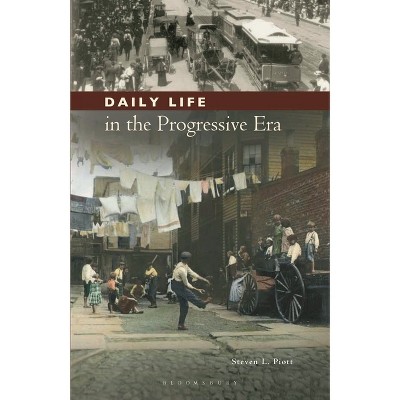A History of Hygiene in Modern France - by Steven Zdatny (Hardcover)

$120.99 when purchased online
Target Online store #3991
About this item
Highlights
- This book tells the story of an epochal change in the human condition that was part of what is often thought of as 'modernization' -a process that remade culture and society in France in the 19th and 20th centuries.Hygiene, Steven Zdatny convincingly contends, was that change.
- About the Author: Steven Zdatny is Professor of History at The University of Vermont, USA.
- 328 Pages
- History, Europe
Description
About the Book
This book tells the story of an epochal change in the human condition that was part of what is often thought of as 'modernization' -a process that remade culture and society in France in the 19th and 20th centuries. Hygiene, Steven Zdatny convincingly contends, was that change. He reflects on how the development of hygiene: changed the way people thought about and treated their bodies; put an end to age-old afflictions and brought comfort where discomfort had been the unavoidable companion of existence; and helped produce a tripling of life expectancy.The book considers how the evolution of hygiene produced a society where people washed often, changed their clothes every day, lived without lice and scabies, and performed their natural functions indoors. It reflects on developments in industrial plumbing, public education, government investment, the invention of new products to keep bodies and homes clean, and a parallel makeover in the expectations, sensibilities, and practices about what is 'proper' and what is disgusting. These developments, the study reveals, were not steady and did not happen everywhere at the same pace. But in the fullness of time, they produced a revolution in the human condition.Book Synopsis
This book tells the story of an epochal change in the human condition that was part of what is often thought of as 'modernization' -a process that remade culture and society in France in the 19th and 20th centuries.Hygiene, Steven Zdatny convincingly contends, was that change. He reflects on how the development of hygiene: changed the way people thought about and treated their bodies; put an end to age-old afflictions and brought comfort where discomfort had been the unavoidable companion of existence; and helped produce a tripling of life expectancy.The book considers how the evolution of hygiene produced a society where people washed often, changed their clothes every day, lived without lice and scabies, and performed their natural functions indoors. It reflects on developments in industrial plumbing, public education, government investment, the invention of new products to keep bodies and homes clean, and a parallel makeover in the expectations, sensibilities, and practices about what is 'proper' and what is disgusting. These developments, the study reveals, were not steady and did not happen everywhere at the same pace. But in the fullness of time, they produced a revolution in the human condition.
Review Quotes
This entertaining book reads like Eugen Weber's classic Peasants into Frenchmen, as Steve Zdatny leads the reader on a veritable romp through earthy quotations from the archives, to memoirs, to literature. Along the way, he reveals a hygienic French revolution, as cleanliness definitively replaced crap in modern France. - Stephen L. Harp, Distinguished Professor, University of Akron, USA.
About the Author
Steven Zdatny is Professor of History at The University of Vermont, USA. He is the author of The Politics of Survival: Artisans in Twentieth-Century France (1990), Hairstyles and Fashion: A Hairdresser's History of Paris, 1910-1920 (1999) and Fashion, Work, and Politics in Modern France (2006).Dimensions (Overall): 9.21 Inches (H) x 6.14 Inches (W) x .75 Inches (D)
Weight: 1.39 Pounds
Suggested Age: 22 Years and Up
Number of Pages: 328
Genre: History
Sub-Genre: Europe
Publisher: Bloomsbury Publishing PLC
Theme: France
Format: Hardcover
Author: Steven Zdatny
Language: English
Street Date: April 18, 2024
TCIN: 1005573891
UPC: 9781350428690
Item Number (DPCI): 247-44-2723
Origin: Made in the USA or Imported
If the item details aren’t accurate or complete, we want to know about it.
Shipping details
Estimated ship dimensions: 0.75 inches length x 6.14 inches width x 9.21 inches height
Estimated ship weight: 1.39 pounds
We regret that this item cannot be shipped to PO Boxes.
This item cannot be shipped to the following locations: American Samoa (see also separate entry under AS), Guam (see also separate entry under GU), Northern Mariana Islands, Puerto Rico (see also separate entry under PR), United States Minor Outlying Islands, Virgin Islands, U.S., APO/FPO
Return details
This item can be returned to any Target store or Target.com.
This item must be returned within 90 days of the date it was purchased in store, shipped, delivered by a Shipt shopper, or made ready for pickup.
See the return policy for complete information.
Trending History

$20.99 - $21.15
MSRP $20.00 - $35.00
Buy 2, get 1 free select books, movies, music & Funko
4.5 out of 5 stars with 10 ratings

$20.80
was $22.40 New lower price
Buy 2, get 1 free select books, movies, music & Funko
5 out of 5 stars with 1 ratings

Highly rated
$7.31
MSRP $7.99
Buy 2, get 1 free select books, movies, music & Funko
5 out of 5 stars with 16 ratings

$15.40
Buy 2, get 1 free select books, movies, music & Funko
4 out of 5 stars with 4 ratings

$20.99
MSRP $32.50
Buy 2, get 1 free select books, movies, music & Funko
5 out of 5 stars with 7 ratings

$17.84
MSRP $28.00
Buy 2, get 1 free select books, movies, music & Funko
5 out of 5 stars with 3 ratings





